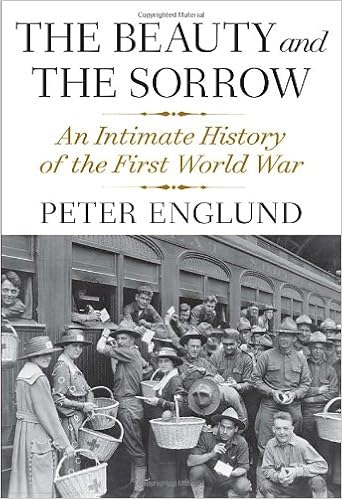Some of the famous statesmen, soldiers, poets and activists of the First World War.
Political leaders during First World War
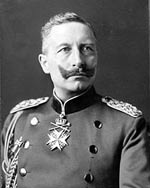 Kaiser Wilhelm II (1859-1941) The last German Emperor; the Kaiser led Germany on a more bellicose, self-assertive foreign policy, where he wished to see Germany become a major European power. He formed a key alliance with Austria-Hungary. But, distrusted by Germany’s military leaders, he had little direct influence on the running of the war.
Kaiser Wilhelm II (1859-1941) The last German Emperor; the Kaiser led Germany on a more bellicose, self-assertive foreign policy, where he wished to see Germany become a major European power. He formed a key alliance with Austria-Hungary. But, distrusted by Germany’s military leaders, he had little direct influence on the running of the war.
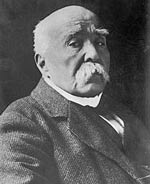 Georges Clemenceau (1841 – 1929) French Prime Minister from 1917-1920. Clemenceau known as the “Tiger” was a key figure in holding French resolve to fight for total victory when others considered negotiating a treaty with Germany. He took a harsh position against Germany at the Treaty of Versailles.
Georges Clemenceau (1841 – 1929) French Prime Minister from 1917-1920. Clemenceau known as the “Tiger” was a key figure in holding French resolve to fight for total victory when others considered negotiating a treaty with Germany. He took a harsh position against Germany at the Treaty of Versailles.
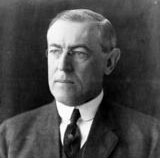 Woodrow Wilson (1856 – 1924) Initially sought to keep America out of the global conflict. But, in 1917, he finally relented and took America into the war against Germany. After the war, he strove to develop the League of Nations and impose a fair peace settlement on the defeated parties.
Woodrow Wilson (1856 – 1924) Initially sought to keep America out of the global conflict. But, in 1917, he finally relented and took America into the war against Germany. After the war, he strove to develop the League of Nations and impose a fair peace settlement on the defeated parties.
 David Lloyd George (1863 – 1945) Prime Minister of the UK from 1916 to the end of war. Played a key role in organising the British war effort. He created a war cabinet of five key people, which he hoped would prevent the mistakes of the first two years.
David Lloyd George (1863 – 1945) Prime Minister of the UK from 1916 to the end of war. Played a key role in organising the British war effort. He created a war cabinet of five key people, which he hoped would prevent the mistakes of the first two years.
 Winston Churchill (1874-1964) First Lord of the Admiralty. Resigned in 1915 for his role in the unsuccessful Gallipoli campaign. He returned as an officer on the Western front for several months. In 1917, he was appointed Minister of Munitions where he was successful in organising supplies.
Winston Churchill (1874-1964) First Lord of the Admiralty. Resigned in 1915 for his role in the unsuccessful Gallipoli campaign. He returned as an officer on the Western front for several months. In 1917, he was appointed Minister of Munitions where he was successful in organising supplies.
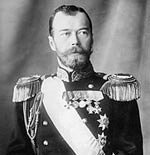 Tsar Nicholas II (1868 – 1918) The last Russian Emperor. As head of state, Tsar Nicholas II approved Russia’s entry into the First World War. Russia lost over 3.3 million men – and disillusionment with the running of the war led to his overthrow in 1917 and Russia’s ultimate exit from the war.
Tsar Nicholas II (1868 – 1918) The last Russian Emperor. As head of state, Tsar Nicholas II approved Russia’s entry into the First World War. Russia lost over 3.3 million men – and disillusionment with the running of the war led to his overthrow in 1917 and Russia’s ultimate exit from the war.
 V.Lenin (1870-1924) – Leader of the Russian Revolution in 1917. With German help, Lenin was smuggled into Russia where he successfully led the Russian revolution and accepted a harsh peace treaty with Germany in return for leaving the conflict.
V.Lenin (1870-1924) – Leader of the Russian Revolution in 1917. With German help, Lenin was smuggled into Russia where he successfully led the Russian revolution and accepted a harsh peace treaty with Germany in return for leaving the conflict.
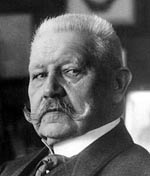 Paul von Hindenburg (1847 – 1934) A Prussian general. Von Hindenburg led the Germany army to a major success at the Battle of Tannenburg. He rose to be Chief of the General Staff and was one of the most influential political figures in the government.
Paul von Hindenburg (1847 – 1934) A Prussian general. Von Hindenburg led the Germany army to a major success at the Battle of Tannenburg. He rose to be Chief of the General Staff and was one of the most influential political figures in the government.
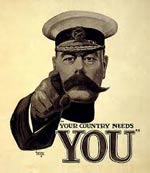 Lord Kitchener (1850 – 1916) Appointed Secretary of State in 1914, Kitchener played a crucial role in raising a large volunteer army in Britain. He led efforts to expand arms production and set Britain on course for the long effort of the war.
Lord Kitchener (1850 – 1916) Appointed Secretary of State in 1914, Kitchener played a crucial role in raising a large volunteer army in Britain. He led efforts to expand arms production and set Britain on course for the long effort of the war.
Generals of First World War
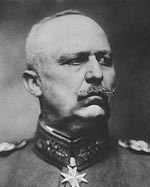
Erich Ludendorff (1865 – 1937) As a German general he achieved major success at Liege and Tannenburg. He rose to be joint head of the German army with Hindenburg. He advocated unrestricted submarine warfare and the policy of ‘lebensraum’. He also led the unsuccessful final German offensive of 1918.
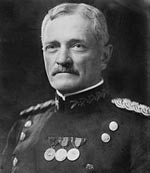 John J. Pershing (1860-1948) Commander in Chief of American forces in Europe. Pershing was adamant that American forces would be commanded by an American and not fall under Allied command. During the final offensive, American troops played a key role.
John J. Pershing (1860-1948) Commander in Chief of American forces in Europe. Pershing was adamant that American forces would be commanded by an American and not fall under Allied command. During the final offensive, American troops played a key role.
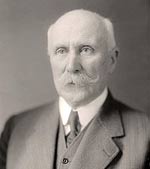 Marshal Phillipe Petain. (1856-1951) The hero of Verdun. French general who helped defend Verdun and maintained the morale of the French army during the difficult mutinous years of 1917. Promoted to Marshal of France.
Marshal Phillipe Petain. (1856-1951) The hero of Verdun. French general who helped defend Verdun and maintained the morale of the French army during the difficult mutinous years of 1917. Promoted to Marshal of France.
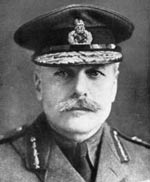 Douglas Haig (1861-1928) British General and Commander in Chief. Best known for his involvement in planning the unsuccessful Somme offensive of 1916. A controversial figure, he was also involved in the final successful Allied offensive of 1918.
Douglas Haig (1861-1928) British General and Commander in Chief. Best known for his involvement in planning the unsuccessful Somme offensive of 1916. A controversial figure, he was also involved in the final successful Allied offensive of 1918.
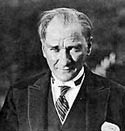 Ataturk (1881-1938) – Turkish general responsible for holding off the Allies at Gallipoli during 1915. In 1917, he was appointed Commander of the Seventh Army. After the war, he led the Turkish national movement in the War of Independence.
Ataturk (1881-1938) – Turkish general responsible for holding off the Allies at Gallipoli during 1915. In 1917, he was appointed Commander of the Seventh Army. After the war, he led the Turkish national movement in the War of Independence.
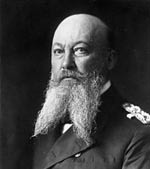 Alfred von Tirpitz (1849 – 1930) German admiral. He was responsible for the build-up of the German navy pre-war, though the German navy was never able to eclipse the British navy. His aggressive submarine war antagonised the Americans, and he was dismissed in 1916.
Alfred von Tirpitz (1849 – 1930) German admiral. He was responsible for the build-up of the German navy pre-war, though the German navy was never able to eclipse the British navy. His aggressive submarine war antagonised the Americans, and he was dismissed in 1916.
Soldiers of First World War
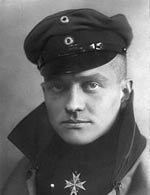 Baron Manfred Von Richthofen. (1892-1918) The ‘Red Baron’ who was the top flying ace of the war. He is credited with 80 air combat victories, despite flying in a highly visible red aircraft. He was killed in April 1918.
Baron Manfred Von Richthofen. (1892-1918) The ‘Red Baron’ who was the top flying ace of the war. He is credited with 80 air combat victories, despite flying in a highly visible red aircraft. He was killed in April 1918.




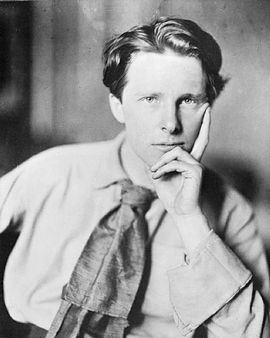 Rupert Brooke ( 1887 – 1915) Idealist war poet. His poem ‘Soldier’ epitomised the willingness for sacrifice and enthusiasm to fight, at the start of the conflict. He was killed in action in 1915. “If I should die, think only this of me; / That there’s some corner of a foreign field / That is for ever England.’
Rupert Brooke ( 1887 – 1915) Idealist war poet. His poem ‘Soldier’ epitomised the willingness for sacrifice and enthusiasm to fight, at the start of the conflict. He was killed in action in 1915. “If I should die, think only this of me; / That there’s some corner of a foreign field / That is for ever England.’
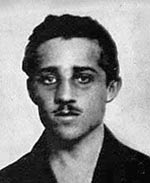 Gavrilo Princep (1894- 1918) a Bosnian Serb who assassinated Archduke Franz Ferdinand of Austria and his wife. This assassination precipitated Austria-Hungary’s invasion of Serbia which led to the start of the First World War. He was sentenced and imprisoned, dying of malnutrition in 1918.
Gavrilo Princep (1894- 1918) a Bosnian Serb who assassinated Archduke Franz Ferdinand of Austria and his wife. This assassination precipitated Austria-Hungary’s invasion of Serbia which led to the start of the First World War. He was sentenced and imprisoned, dying of malnutrition in 1918.
Non-Combatants




Spies of the First World War
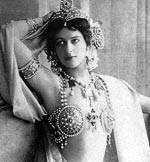 Mata Hari (1876 – 1917) Mata Hari was a Dutch exotic dancer who was a lover to French, German and Russian army officers. She was executed by a French firing squad in 1917 for espionage, though evidence of any espionage was sparse.
Mata Hari (1876 – 1917) Mata Hari was a Dutch exotic dancer who was a lover to French, German and Russian army officers. She was executed by a French firing squad in 1917 for espionage, though evidence of any espionage was sparse.
Citation: Pettinger, Tejvan. “Famous People of the First World War”, Oxford, biographyonline.net – 11 Nov. 2014. Updated 17th February 2017.
An Intimate History of the First World War
Forgotten voices of the Somme at Amazon.co.uk – a sample of the ‘unknown soldier’s experience.
Related

 Military figures – Famous military leaders and soldiers, including; Alexander the Great, Napoleon, Ataturk, Erwin Rommel, Winston Churchill and Dwight Eisenhower.
Military figures – Famous military leaders and soldiers, including; Alexander the Great, Napoleon, Ataturk, Erwin Rommel, Winston Churchill and Dwight Eisenhower.



